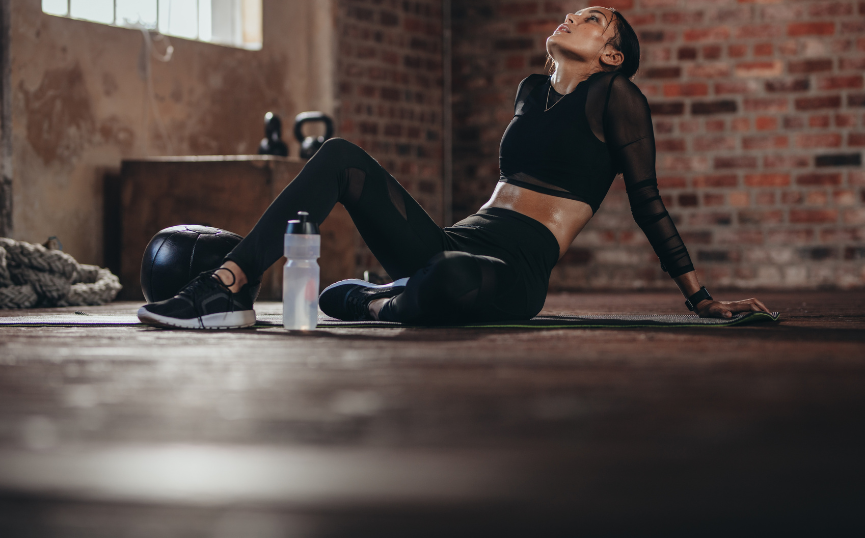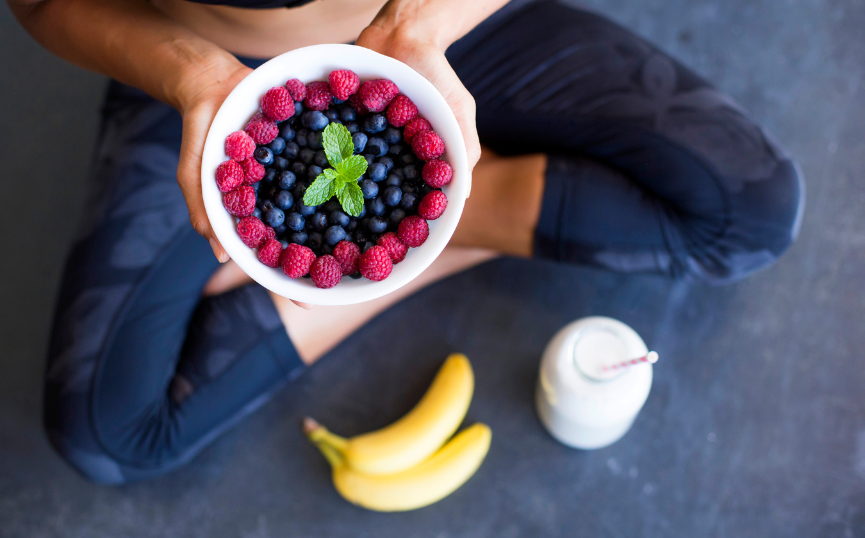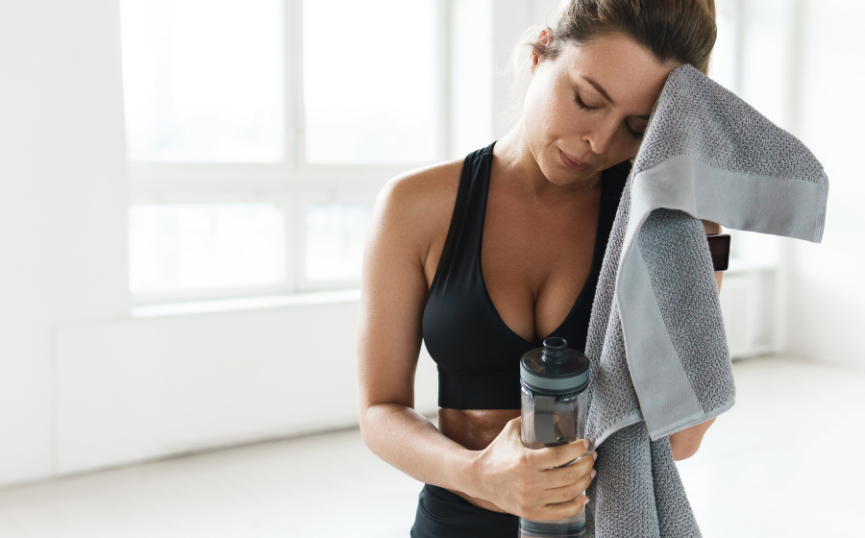Why might you feel sick after an intense workout?
Exercise is supposed to make everyone feel more energetic, refreshed and motivated throughout the day. Exercise can give you an overall 'healthier me' feeling, which, with a well-constructed exercise plan, can put a 'positive stamp' on the whole day. What if we experience the exact opposite? Many people find that a few hours after an intense weight training session, yoga or other strenuous exercise, they feel sick: exhausted, tired, sometimes even feverish or 'sick'. If this happens regularly, it can be frustrating. Especially because exercise should actually make you feel better.
Let's look at what might be behind this and how can we avoid it? Read the article to see the more positive side of exercise!

1. Start with the most important thing: choose the right intensity.
This may seem obvious, but in practice it's a bit difficult to control. Let's take an example: you've been running 5 km every other day for 1 month, what happens if you suddenly switch and run, say, 15 km? Presumably you will feel bad afterwards. In such a case, it is clear that the sudden increase in exertion (stimulus) caused the increased fatigue/illness.
This is also often experienced by beginners/re-starters who immediately jump into the deep end and start with a strong, intense workout. It is important to note here that intense physiotherapy, yoga, walking or pilates can be too demanding for an unprepared individual. A sudden increase in weight for sprints at max effort is far more likely to cause complaints for someone who is unprepared.
Take this as a starting point if you often experience complaints after workouts: reduce the intensity, find a dose that doesn't cause problems yet, and then build your training plan from there. If that doesn't help, read on!
2. Intense exercise and the immune system1,2
Intense exercise stresses the immune system. According to the so-called "open window " theory, the immune system can become so weakened in the few hours following exercise that the body may become more vulnerable to infection. If you already have a mild virus in your body, you are more likely to develop symptoms after a hard workout. Although these may cause acute symptoms rather than chronic ones. If you have a chronic problem, it can only be partly explained by the effects on your immune system. This will be discussed in more detail below.
3. Overtiredness3
Exercise is also stressful for your body, i.e. strenuous exercise temporarily increases levels of a stress hormone called cortisol. Of course, by the end of the workout, most of the time the gross effect is pulling you towards the happy hormones. That's why we become more balanced and in a better mood after exercise, but if you don't allow enough time for rest, your body can go into a constant state of stress. When this happens, the gross hormonal effect is shifted towards cortisol, which can lead to long-term moodiness, fatigue and a weakened immune system.

4. Nutrient deficiency4-11
If you've got everything just right and you're still feeling chronically tired after training, it's worth getting a comprehensive blood test. You need: magnesium, potassium, calcium, sodium for muscle contraction. B vitamins for the proper functioning of the nervous system. For proper blood sugar levels, chromium. And for proper metabolism, coenzyme Q10, vitamin C and iron. A deficiency of any of these nutrients can cause an increased feeling of fatigue.
To supplement these, it is worth choosing a comprehensive multivitamin. Choose the best of the best: GAL+ Multivitamin [New Prescription] (205.9 g) or Life Extension Two Per Day - Multivitamin (120 Tablets).
A multivitamin specifically designed for athletes is Universal Nutrition Animal Pak - Complex Multivitamin (44 Packs).
If you've had a comprehensive check-up and everything is fine, you may even have a temporary nutrient deficiency. This means that if you don't replenish the nutrients you've lost properly after exercise, it can also cause fatigue and malaise. Especially important:
- Replenishing electrolytes: When you sweat, you can lose a lot of sodium, potassium and magnesium, the lack of which can cause weakness, headaches and malaise. You need to replenish carbohydrates and electrolytes in the form of energy gels during exercise during long cardio workouts.12 Choose Science in Sport Gel Variety Pack - Isotonic Energy Gel in Multiple Flavours (7 x 60 ml).
- Carbohydrates and proteins: Energy replenishment after exercise is essential. If you don't eat properly after a workout, your muscles can't recover and your body feels exhausted.
So eat a meal with high protein and complex carbohydrates with adequate salt content 1-1.5 hours after exercise. If not, drink a protein shake and eat fruit with it to replenish minerals. If you're unprepared or in a hurry, Vitamin360 also has a range of protein bars for after a workout.
5. Dehydratation
We simply underestimate the importance of drinking water, but if you don't drink enough...
Especially in hot environments or during prolonged exercise, hydration is of particular importance. Dehydration can lead to discomfort, dizziness and fatigue. By sweating, you lose not only water but also important minerals that need to be replenished.

6. Blood sugar fluctuations
If you're still getting everything right, it could be your blood sugar! This is especially true during intense exercise, because as you increase the workload, your body turns to glycogen (sugar) stored in your cells for energy rather than fat.
Too low a blood sugar level (hypoglycaemia) can cause symptoms such as:
- Dizziness
- Weakness
- Nausea
- Chills or sweating
If you are used to experiencing hypoglycaemic symptoms, too intense exercise may trigger symptoms. Or if you haven't eaten properly beforehand it can also bring your blood sugar levels down (causing hypoglycaemia).
If this happens to you regularly, try to watch what you eat, i.e. eat plenty of fibre and avoid simple carbohydrates (white wheat flour and/or high-sugar products).
Before exercising, eat a source of carbohydrate that is easy to digest but not too quickly absorbed (such as a banana or a small portion of porridge).
7. Inflammatory processes13,14
There are few commonly available measures of chronic, cellular inflammation and unfortunately most people can suffer from its symptoms. Exposure to toxins in the body (of which we have plenty in our daily lives) is much more likely to overload the immune system and increase cellular inflammation than exercise. If there is already increased inflammation in the body, exercise can only make things worse.
Ensure that your body is replenished with antioxidants to fight toxins (free radicals). Use the following supplements:
- A multivitamin preparation such as GAL+ Multivitamin [new recipe] (205.9 g) or Life Extension Two Per Day - Multivitamin (120 Tablets).
- A quality Omega 3 such as GAL Ω3 Fish Oil - Omega-3 (250 ml) or its capsule form GAL Omega-3 Eco (60 Softgels).
- Periodically use a plant extract with a strong antioxidant effect. Click here for more information.
Summary: how can you prevent feeling unwell after a workout?
If you find that you feel unwell after a workout, try the following tips:
- Replenish electrolytes and fluids! Drink plenty of water and if you sweat a lot during long cardio workouts, replenish electrolytes.
- Eat a proper post-workout meal!
- Pay attention to recovery!
- Avoid overexertion! If you are constantly feeling tired, you may need to cut back on intensity or frequency.
- Watch your blood sugar! Don't exercise on a completely empty stomach and, if necessary, consume fast-absorbing carbohydrates after exercise.
- Listen to your body!
- Consult an expert! If you regularly feel unwell after exercise, it's a good idea to consult an expert (such as a dietician or sports doctor) to rule out any nutritional deficiencies or health problems.
Viaticum
If you regularly feel sick after exercise, there are many reasons for this, including over-exertion, inadequate recovery, nutrient deficiencies or dehydration. Proper nutrition, hydration and rest can help you feel better after exercise.
If the problem is long-standing, seek individualised advice from a sports doctor. You should also seek help if you have ticked all the boxes in your lifestyle, training plan, diet and supplementation routine but the problem persists.
The Vitamin 360 team wishes you good training and recovery!
- Gleeson M, et al. "Immune function in sport and exercise," Journal of Sports Sciences, 2011
- Peake J, et al. "Endurance exercise and the immune system: an overview," Journal of Sports Sciences, 2012
- Kreher JB, Schwartz JB. Overtraining syndrome: a practical guide. Sports Health. 2012 Mar;4(2):128-38. doi: 10.1177/1941738111434406. PMID: 23016079; PMCID: PMC3435910.
- Cuciureanu MD, Vink R. "Magnesium and stress." Journal of the American College of Nutrition, 2012.
- Gowda U, et al. "Potassium supplementation improves performance in athletes." Journal of Clinical Sports Medicine, 2013.
- Snyder AC, et al. "Effects of sodium supplementation on endurance exercise performance." Journal of Sports Nutrition, 2015.
- Cohen D, et al. "B-Vitamin Deficiency in Athletes: Potential Causes and Effects." Journal of Sports Medicine, 2017.
- Kehinde O, et al. "Chromium supplementation and exercise performance." Journal of the International Society of Sports Nutrition, 2014.
- Mills P, et al. "Coenzyme Q10 supplementation and exercise performance: a systematic review." Sports Medicine, 2010.
- Shin M, et al. "Effect of vitamin C supplementation on exercise-induced muscle damage." Journal of Sports Medicine, 2014.
- Ehrman T, et al. "Iron deficiency and athletic performance." International Journal of Sports Nutrition and Exercise Metabolism, 2017.
- Latzka WA, Montain SJ. Water and electrolyte requirements for exercise. Clin Sports Med. 1999 Jul;18(3):513-24. doi: 10.1016/s0278-5919(05)70165-4. PMID: 10410838.
- Furman D, Campisi J, Verdin E, Carrera-Bastos P, Targ S, Franceschi C, Ferrucci L, Gilroy DW, Fasano A, Miller GW, Miller AH, Mantovani A, Weyand CM, Barzilai N, Goronzy JJ, Rando TA, Effros RB, Lucia A, Kleinstreuer N, Slavich GM. Chronic inflammation in the etiology of disease across the life span. Nat Med. 2019 Dec;25(12):1822-1832. doi: 10.1038/s41591-019-0675-0. Epub 2019 Dec 5. PMID: 31806905; PMCID: PMC7147972.
- Pahwa R, Goyal A, Jialal I. Chronic Inflammation. [Updated 2023 Aug 7]. In: StatPearls [Internet]. Treasure Island (FL): StatPearls Publishing; 2025 Jan-. Available from: https://www.ncbi.nlm.nih.gov/books/NBK493173/


